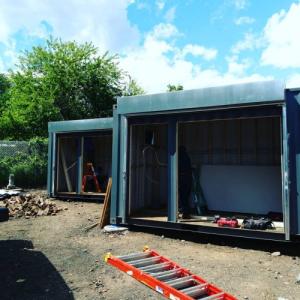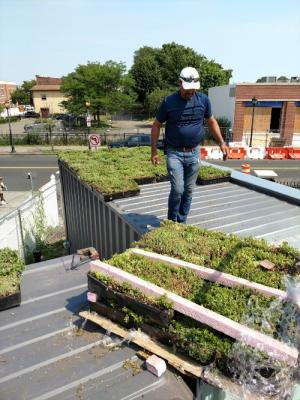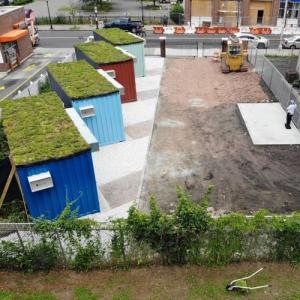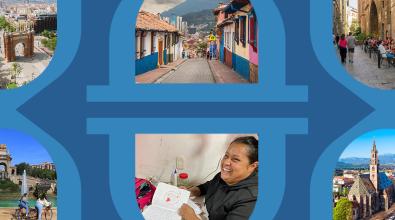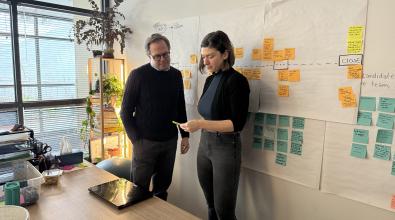In Jersey City, a pop-up approach to helping small businesses
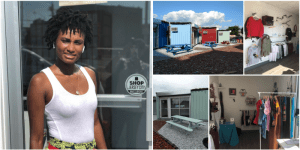
Since she started selling apparel to new mothers four years ago, Nia Reid-Allen has mostly met her customers in vending booths at street fairs or in bits of storefront space she’s borrowed from friends.
Now, the Jersey City, N.J., resident finally has a retail space of her own, in a pop-up village of converted shipping containers that is the city’s newest place to shop. Thanks to a new city initiative, Reid-Allen will get a few months of free rent plus coaching on everything from marketing to bookkeeping. It’s all aimed at helping small business owners like her take their enterprises to the next level.
“It feels amazing to wake up and go to work in my own space,” said Reid-Allen, who’s been busy decorating the 8-by-20-foot store with wicker wall hangings and other trimmings of what she calls a “momma earth” look. “It’s difficult for small businesses to compete,” she said. “It’s great that the city is giving the small guy a break to help us catch up.”
The container village is a product of a city-led innovation process that started a few years ago. The city’s innovation team, launched with support from Bloomberg Philanthropies, spent a year probing the question of how City Hall could better support small businesses. The team’s research and interviews with stakeholders kept pointing to the same problem: high rents.
“We have lots of initiatives for small businesses, from grants to loans to help with marketing and advertising,” said Brian Platt, who was the i-team’s director at the time and now serves as the city manager. “The big thing that was always missing for businesses was actual affordable space.”
As it happened, the city owned some land in an underserved business district known as Jackson Hill. A new City Hall annex and a city-operated health clinic had already gone in here, bringing with them hundreds of municipal employees and healthy foot traffic. City leaders saw an opportunity to experiment and learn about a new way to boost small businesses — and the abundance of shipping containers from nearby ports lowered the stakes by minimizing the cost.
“The benefit is two-fold,” said Mayor Steven Fulop. “The business incubator supports small businesses by providing an innovative, low-cost approach for new and startup businesses,” while putting vacant land along a busy street to a positive use.
City leaders also knew that to be successful, the city couldn’t do it all alone; the project had to be a collaboration. To provide counseling and mentorship for tenants like Reid-Allen, they partnered with the Jersey City Economic Development Corporation and a nonprofit called Rising Tide Capital, two local organizations who do this work already and are deeply networked with local entrepreneurs. To vet and manage the vendors, they partnered with the neighborhood’s business improvement district.
[Read: Three tips on cross-sector collaboration]
“The innovation is that we put the pieces together in a way that does not break the bank on our end and offers a real solution to a real problem in our community,” said Chief Innovation Officer Melissa Kozakiewicz. “This is a lift we can provide business owners so they can try out having a storefront without having to spend thousands of dollars on rent, which is a lot of money to make a mistake if you’re just learning and trying out what it feels like to have your own space.”
“It’s a really collaborative effort,” added Vanessa Quijano, who leads small business development for the Economic Development Corporation. “A lot of entrepreneurs I meet with don’t yet have the capital to set up a shop, or they’re still testing out their products. This gives them a storefront they can brand, a way to understand the flow of their shop or business, and learn how to deal with competition.”
“Pop Up Jackson Hill” is located across the street from the municipal complex, and consists of four shipping containers that have been framed out with drywall and flooring on the inside, glass front doors and “green” roofs with plantings up top. There’s electricity, air conditioning, and portable toilets on site. There’s also space for a few food trucks.
The four vendors are now settling in as the site soft-launches. In addition to Reid-Allen’s shop, there’s stores selling African clothing and accessories, skincare and home decor, and all-natural dog treats. The idea is that the owners of these businesses will get three months of free rent — worth about $1,700 a month — and use what they have learned to go out on their own before a new crop of entrepreneurs cycles in. Kozakiewicz said the city would consider extending a tenant’s tenure as the project evolves.
[Read: Prototyping city solutions and launching a revolution]
For Reid-Allen, this is a big step in a journey that began in 2011 when she moved to Jersey City from Brooklyn and gave birth to a daughter. Reid-Allen, who has worked on and off as a fashion and beauty model, found a hole in the retail clothing market. “In the world of motherhood and maternity, brands speak to you while you’re pregnant, but there’s nothing when you bring the kid home,” Reid-Allen said. “My niche is directed to helping moms feel good and looking great in that fourth trimester.”
In addition to selling clothing, Reid-Allen teaches fitness classes and leads women’s wellness workshops for clients such as the city’s health department. She’s been a regular presence among the vendors at street fairs and other community events, and has used social media and mom meetups to build a growing customer base both in person and online. She couldn’t be more excited now to have a physical store to call her own.
“I grew up with my mother owning stores that I’d work in as a kid, so I understand that retail world well,” Reid-Allen said. “It feels nice to have all my stuff laid out in one location. I recently got an official ‘Shop Jersey City Buy Local sticker to put in my window. It means the world to me to be a bonafide business.”
